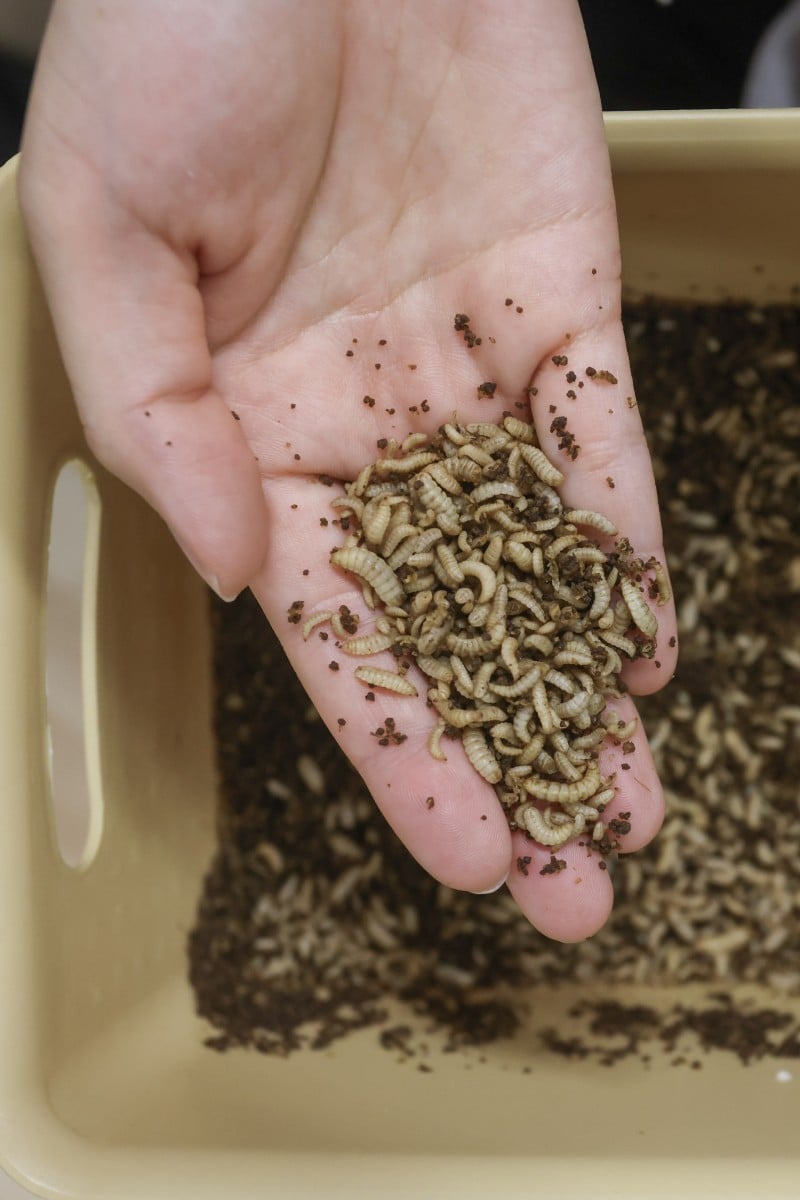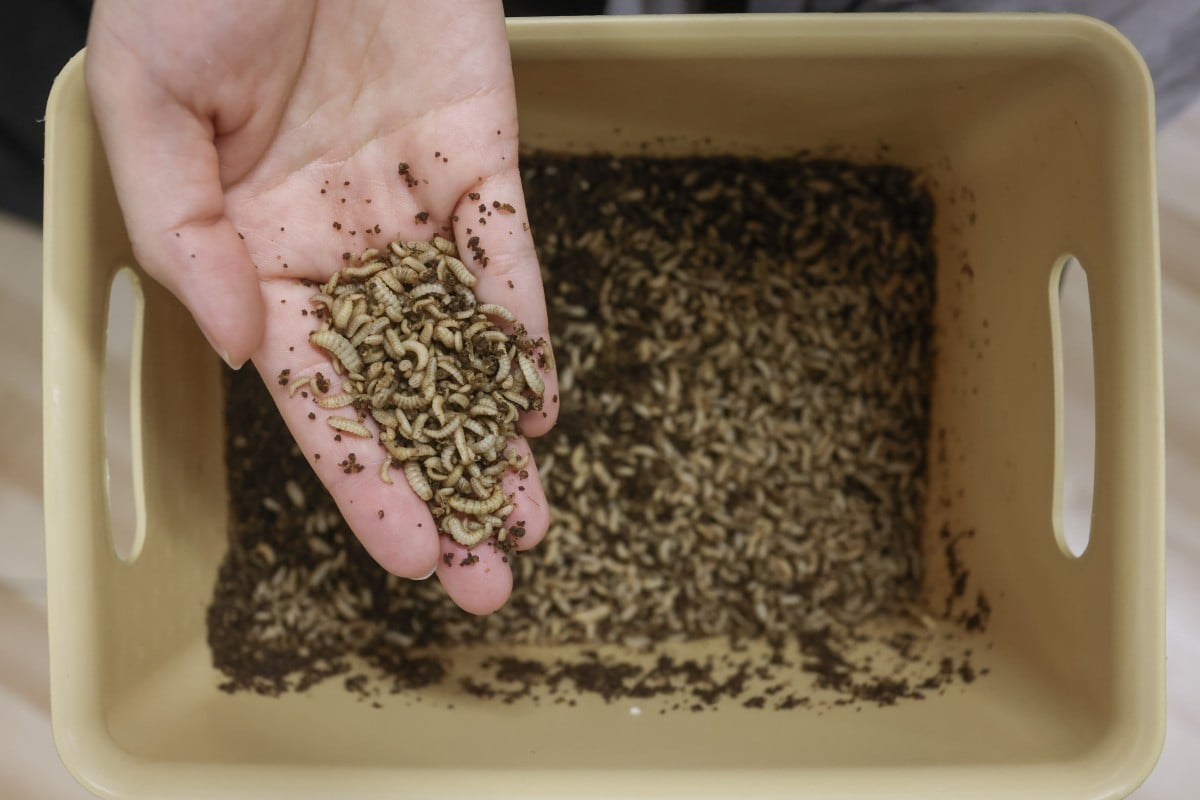
Hong Kong start-up flies in the face of food waste using insects to create compost
Social enterprise Japjap aims to use its innovative bio-recycling system to educate people about sustainable waste solutions.
 Rosie Chan holds the black soldier fly larvae that are responsible for eating organic waste. Photo: Jonathan Wong
Rosie Chan holds the black soldier fly larvae that are responsible for eating organic waste. Photo: Jonathan WongWhile travelling in Japan, Hongkonger Rosie Chan decided to work on a local farm to fund her stay. There, she realised that nothing was considered waste – everything could return to the soil.
“I saw that many things could be reused, especially natural materials like bamboo and wood. Even when these materials wear out, they can be repaired, and when they can’t be fixed any more, there are ways to return them to nature,” said Chan, who is in her 30s.
“In Hong Kong, we’re used to handling waste by sending it to landfills, and that’s the end of it. But my time in Japan showed me that nothing has to end up in a landfill.”
This experience planted a seed in Chan’s mind. Later, as a student at Hong Kong Polytechnic University (PolyU), she was visiting Wan Chai market for her capstone project, when she saw mountains of discarded food and wooden pallets.
It sparked an idea that would eventually become Japjap, a social enterprise she founded last year that uses black soldier fly larvae to transform food waste into fertiliser.
Deep Dive: Hong Kong’s efforts to fight food waste
These insects break down organic waste – a process already being used in places like Britain and Singapore – and the flies themselves can also be turned into compost, oil or animal feed.
Inspired by her childhood vision of pallets as giant drawers that could store anything, Chan’s bio-recycling system houses black soldier flies in upcycled pallets.
Chan’s mission is to offer an alternative solution for treating the city’s food waste.
“We want to move away from centralised waste processing methods that generate pollutants and greenhouse gases,” the founder said, referring to Hong Kong’s landfills.
“Instead, we’re adopting a decentralised approach: collecting food waste locally and processing it immediately.”
From office jobs to a social enterprise
Before journeying into sustainable waste solutions, Chan felt unfulfilled working in corporate jobs.
Having only completed Form Five, Chan attempted various careers, including finance, insurance and even jewellery design. But none of these paths resonated with her.
“I was just helping my boss make more money, and it felt meaningless. I knew I was hardworking, but I felt lost because I didn’t know how to use my strengths,” she said.
After working for eight years, Chan quit her job to travel and eventually discovered her passion for interior design. To make up for a low score on the university entrance exam, she enrolled in courses at the Hong Kong College of Technology and HKU Space, before eventually applying for a bachelor’s degree at PolyU.
Although she only had enough savings for one semester’s tuition, she was determined to succeed. She studied hard and earned a scholarship.
After discovering her passion for sustainable design, Chan is now pursuing a PhD at PolyU while also working on Japjap.
The need for education
One of Japjap’s biggest hurdles is people’s fear of black soldier flies.
“But why? They don’t have teeth; they don’t bite, and they’re cleaner than you think – they even have antibacterial properties,” Chan said.
“That’s why education is so important, especially starting with children.”
Japjap’s first recycling station started operating at Yan Chai Hospital Lan Chi Pat Memorial Secondary School in 2023, and Chan hopes to expand it to more locations soon. At the school in Tseung Kwan O, Chan conducts workshops to show pupils how to process food waste before feeding it to the black soldier flies. She also conducts STEAM classes in other schools.
“The first activity is usually to observe and interact with insects. Once kids have touched them, they’re no longer afraid,” she said.
Lingnan University students explore green living from a grass-roots level
“Some [students] are curious – they’ll catch, observe and want to learn about the bugs. Even those who are initially scared often become more comfortable after seeing their friends interact with them.”
Chan also organises farm visits for groups of all ages to learn about organic farming, pick produce, make food and feed leftovers to insects.
“This sparks curiosity and questions – like whether insects can eat certain items or even if they themselves can eat insects,” the founder said.
By the end, participants see the full cycle of how food waste becomes compost that feeds new plants. For Chan, nature-based solutions for waste are key because they keep the resource cycle going.
“By processing food waste with insects, we turn it into useful products, returning nutrients from leftovers back into the soil.”
To test your understanding of this story, download our printable worksheet or answer the questions in the quiz below.
On November 7, Rosie Chan will attend the Chinachem Group Sustainability Conference 2024 to share her experience in innovation and technology. Under the theme of “Integrating Sustainability Solutions towards a Resilient Future”, the conference is open for the public to join both online and in person.
